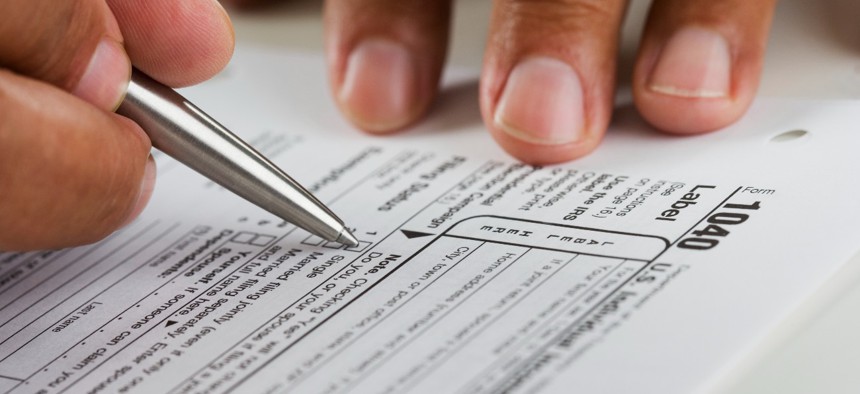
JGI / Getty Images
The IRS’ Privatized Debt Collection Program Is Bringing In Less Revenue Than Expected and Underreporting Costs
The IRS' own employees funded through the program have accounted for half of the initiative's net revenue.
A program Congress authorized in 2015 for the Internal Revenue Service to outsource the collection of some outstanding tax debt has brought in only about half as much money as projected, according to a new audit, while racking up costs the agency has not properly reported.
The private debt collection program has brought in a total of nearly $970 million through fiscal 2020, the Treasury Inspector General for Tax Administration found in a new report, leading to net revenue for the government of $679 million after the companies take their 25% cut. That is far below the Congressional Budget Office’s projection that the program would have earned $1.9 billion by that time. IRS has assigned the companies 3.4 million cases valued at $32 billion in tax debt.
IRS has also underreported costs of the program by $7 million, the IG said, by failing to track the full price of background checks, printing, postage, counsel and cyber security. Those issues are ongoing, the auditors added. IRS officials disputed the accusation, saying the underreporting was far less and it was largely following its statutory obligations. The IG countered the agency was failing to give lawmakers and other stakeholders a full accounting of what it has taken to operate the program.
The privatization is the third such effort IRS has administered since 1995, with previous iterations quickly canceled due to poor management and negative returns. IRS launched the most recent program last year after President Obama signed a law mandating it in 2015. The IG previously found in a scathing report that the private companies were leaving taxpayers vulnerable to scams and exploitative practices, being trusted to self-report complaints and bringing in just a small fraction of the debt they are assigned to collect.
The program was established despite pushback from some lawmakers, good government groups and employee advocates, who warned that history has shown the privatization of tax debt collection is inefficient and targets the nation’s most vulnerable taxpayers.
As required under the law, IRS has used some of the proceeds from the privatization effort to hire 400 of its own compliance personnel. Those employees have accounted for about half of the net revenue the government brought in from the program.
While the initiative was designed to reimburse its costs, the IG found actual expenses are far outstripping the reimbursements. IRS has used about $36.5 million of its own appropriations to cover costs related to the private collection program without disclosing it.
Kristin Walter, a spokesperson for The Partnership for Tax Compliance, a group that represents private companies in the debt collection program, said the initiative was succeeding.
"TIGTA and the IRS seem to have different views of the best way to calculate some of the program costs, but what no one disputes is that the PDC Program has helped taxpayers get back on track and brought in more than $1 billion to help fund the government," Walter said.
The National Taxpayer Advocate has been a frequent critic of the program and said last year IRS unfairly terminated repayment agreements with thousands of taxpayers after some of the contracts under the initiative expired. The agency has since worked to reestablish those plans under its new vendors. The advocate's office previously said its predictions that the program would target taxpayers struggling to meet their basic living expenses had come to fruition. The office found in 2018 that one-in-five taxpayers targeted by the private companies were living below the federal poverty line.
Some Democratic lawmakers have introduced legislation to once again force IRS to terminate the program. Sen. Ben Cardin, D-Md., said in 2018 it was unfair and a waste of money.
“Putting a bullseye on the back of low-income taxpayers has lost taxpayer dollars every time it has been tried,” he said. “It needs to stop for good.”







